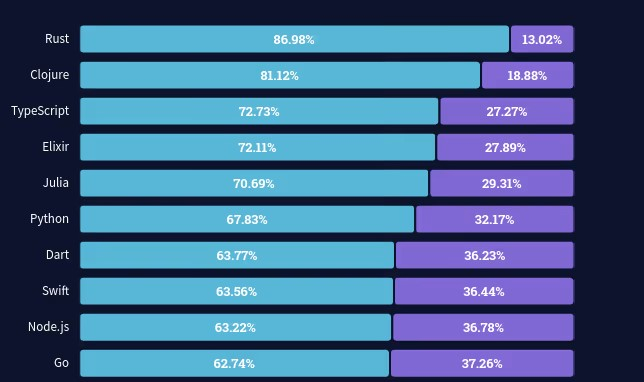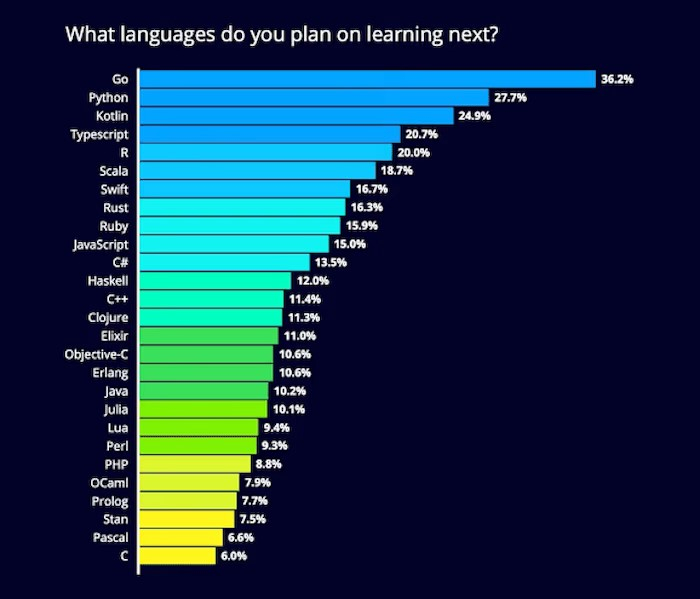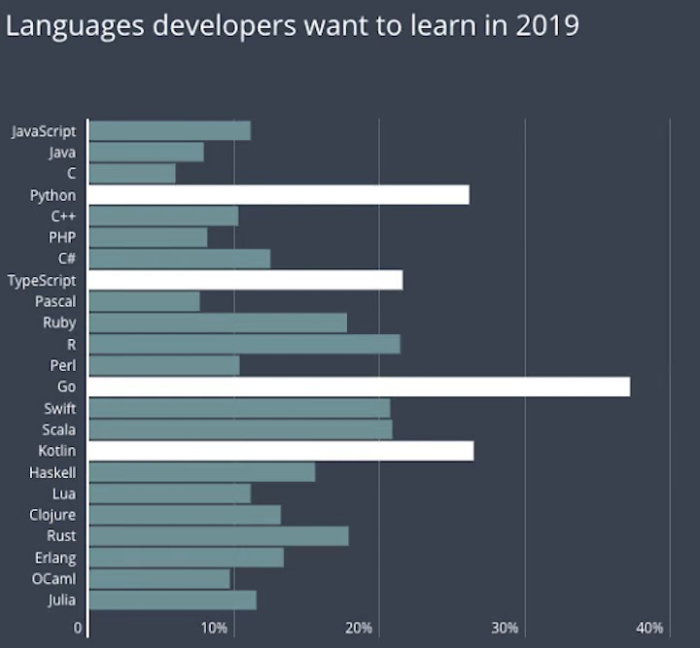
 Data Structure
Data Structure Networking
Networking RDBMS
RDBMS Operating System
Operating System Java
Java MS Excel
MS Excel iOS
iOS HTML
HTML CSS
CSS Android
Android Python
Python C Programming
C Programming C++
C++ C#
C# MongoDB
MongoDB MySQL
MySQL Javascript
Javascript PHP
PHP
- Selected Reading
- UPSC IAS Exams Notes
- Developer's Best Practices
- Questions and Answers
- Effective Resume Writing
- HR Interview Questions
- Computer Glossary
- Who is Who
Will Python be replaced in the future? If so, by which language?
In this article, we will Python's limitations, as well as which aspects of Python can be replaced by another language
Both Rust and Python are popular programming languages with applications in software development and data analysis. Rust's popularity has increased dramatically in recent years, causing many to question if it could eventually overtake Python as the most popular programming language.
Disadvantages of Python
Python is very slow. Although Python is simple to write, it takes 2-10 times longer to finish a task than other computer languages. One of the main reasons for this is that Python is dynamically typed, which means you don't need to define data type while coding. It requires a significant amount of memory because the program saves enough space for each of its unknown variables. It takes a long time to compute since a large amount of memory space is used.
Moreover, Python can only run one task at a time. This is also due to the variable's non-predefined data types. It would be a disaster or mess up if parallel processing was used here. Even when compared to a standard web browser, which can run many web browsers at once, this is a disadvantage of Python.
Scope
Python was by default dynamically scoped. This basically means that if you want to evaluate an expression, a compiler will start its search from the current block and proceed to work through all the calling functions. This means that each expression must be checked in every possible context. Most current languages use static scoping to address this problem.
Python was intended for static scoping, however, it did not happen. Functions within functions can see the change of the outer scope or functions in this scenario. However, in Python, inner functions can only observe the outer functions. They cannot, however, change them. This causes a great deal of misunderstanding.
Lambdas
Python offers a lot of flexibility, but surprisingly, the use of Lambdas is limited. In Python, Lambdas can only be used as expressions, not as statements. Variable declarations and statements, on the other hand, are always statements. As a result, you can utilize Lambdas for them. This is an arbitrary distinction between statements and expressions that do not exist in other programming languages.
Whitespaces
In Python, whitespaces and indentations are used to signify distinct code levels. However, while this makes the code visually nice and easy to read, it does not make it maintainable. When compared to other high-level programming languages such as C++, Python relies heavily on semicolons and braces. As a beginner, it may be awkward to match the braces or easy to make a mistake while inserting semicolons, but it makes code more usable in larger projects.
Mobile Development
Mobile development is a rapidly expanding field, as more people transition from desktops to smartphones. To construct mobile software, a powerful language is required. In this field, many programming languages are flourishing.
However, we do not expect Python to make a serious drive in this interesting area. Yes, we have Kivy, a Python module for this purpose, and it's not that Python can't produce results in mobile development, but to be honest, Python was not designed for mobile programming. Flutter, React Native, Ionic, and Cordova frameworks are commonly used in this environment.
As a result, we may conclude that learning Python is not the programming language of the future in mobile development.
Runtime Errors
A Python script, unlike other programming languages, does not compile first and then run. Instead, it compiles each time the code is executed. As a result, a coding mistake may occur during runtime. This results in increased time consumption, poor performance, and the necessity for numerous tests.
This may sound appealing to beginners because testing allows them to learn a great deal. Debugging in python is complex and makes the developers bored. This performance issue sets timestamps on Python.
Languages that may one day replace Python
A few new competitors on the market are attempting to address Python's drawbacks. Here are three main ones that are effectively exploiting Python's weaknesses and preventing it from being the programming language of the future ?
Rust ? Rust features a Python-like functionality that prevents inadvertent variable overwriting. It has, however, addressed the performance issue through the concept of borrowing and ownership. According to StackOverflow Insights, it is one of the most popular programming languages in recent years.
Go ? Go, like Python, is good for beginners. Moreover, code maintenance is quite simple. Go programmers are among the highest-paid programmers in the industry.
Julia ? Julia is a relatively new language, but it competes directly with Python. It's ideal for large-scale technical calculations: Assume you use Python or Matlab for technical computation and aggregate the whole thing with C++ libraries. Julia eliminates the need to manage two languages.
What is Rust?
Rust is a multi-paradigm programming language that enables developers to create reliable and efficient applications. Rust, like C and C++, emphasizes safety and performance, and it is fast and memory-efficient without garbage collection. Rust may be integrated with other languages and operate on embedded systems.
Rust features good documentation, an easy-to-use compiler with useful error messages, and cutting-edge technology like an integrated package manager, build tools, smart multi-editor support with autocompletion and type inspections, an autoformatted, and more.
At first glance, Rust's statically and highly typed nature may appear extreme. However, in the long term, you'll notice that this helps to prevent unexpected code behavior.
Could Rust eventually replace Python?
Given Rust's rapidly increasing popularity and the broad range of use cases, it appears that it will beat Python in the near future. Consider some of the reasons why.
Performance
Performance is a major reason why Rust is overtaken Python. There is no virtual machine or interpreter between your code and the computer since Rust is compiled directly into machine code.
Another significant advantage of Rust over Python is its thread and memory management. While Rust lacks garbage collection, the compiler enforces checks for invalid memory reference leaks and other dangerous or irregular behavior.
In general, compiled languages are faster than interpreted languages. But what sets Rust apart is that it is nearly as fast as C and C++ without the overhead.
Security
Rust features an incredibly strict typing system, which provides many advantages to developers, including the following ?
- Better understandable error messages
- Avoid several of the common memory management(pitfalls) mistakes in C/C++.
- Improved automated documentation facilities
Software security problems are frequently caused by mishandled memory or unanticipated errors in the coding. This rigor in Rust allows us to detect and prevent such problems before they reach the user.
Memory management
Python, like the majority of current computer languages, is memory-safe. Even without garbage collection, Rust gives Python a run for its money in terms of memory safety.
Rust adopted a unique approach to memory safety that includes an ownership system and a borrow checker to verify that references and pointers do not outlive the data to which they point.
Error checking and diagnosis
Python, like many other programming languages, has error-checking and logging features. However, there is some difference between Rust and Python when it comes to informing the developer of what went wrong.
Also, Rust allows Parallel computing
Community
As previously stated, Rust has selected the favorite programming language of 2021 by 86.98 percent of respondents to Stack Overflow's 2021 Developer Survey ?

Similarly, in the 2020 HackerRank Developer Skills Report, respondents listed Rust as one of the top ten programming languages they intend to study next ?

In contrast, Rust was at the bottom of the list in the 2019 survey, indicating that the community of Rust developers is fast growing ?

As seen by these statistics, Rust is entering the mainstream developer community. Rust is used by many large corporations, and some developers even use it to create libraries for other programming languages. Mozilla, Dropbox, Atlassian, npm, and Cloudflare are among the notable Rust users.
Conclusion
It is an obvious reality that Python has widespread appeal at the time, and competitor languages will not be able to overcome Python programming language overnight. These new languages may take 5-10 years to replace Python's popularity.
However, it is difficult to predict which language will eventually supplant Python - Rust, Go, Julia, or something entirely new. However, Python's performance issue is probably its major disadvantage, and it will inevitably be replaced in the future as a basic aspect of architecture. As a result, we can conclude that Python will not be the programming language of the future.

